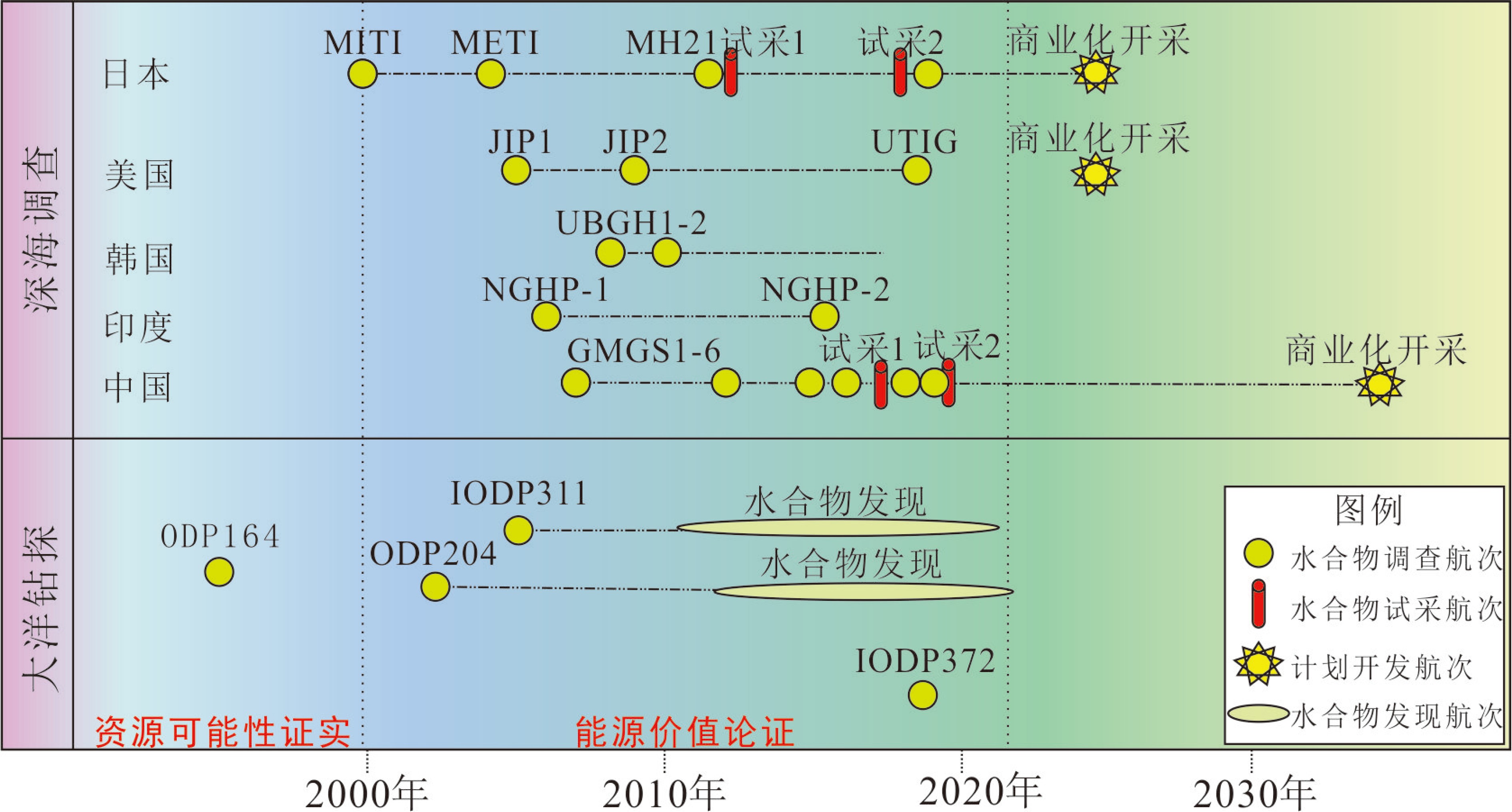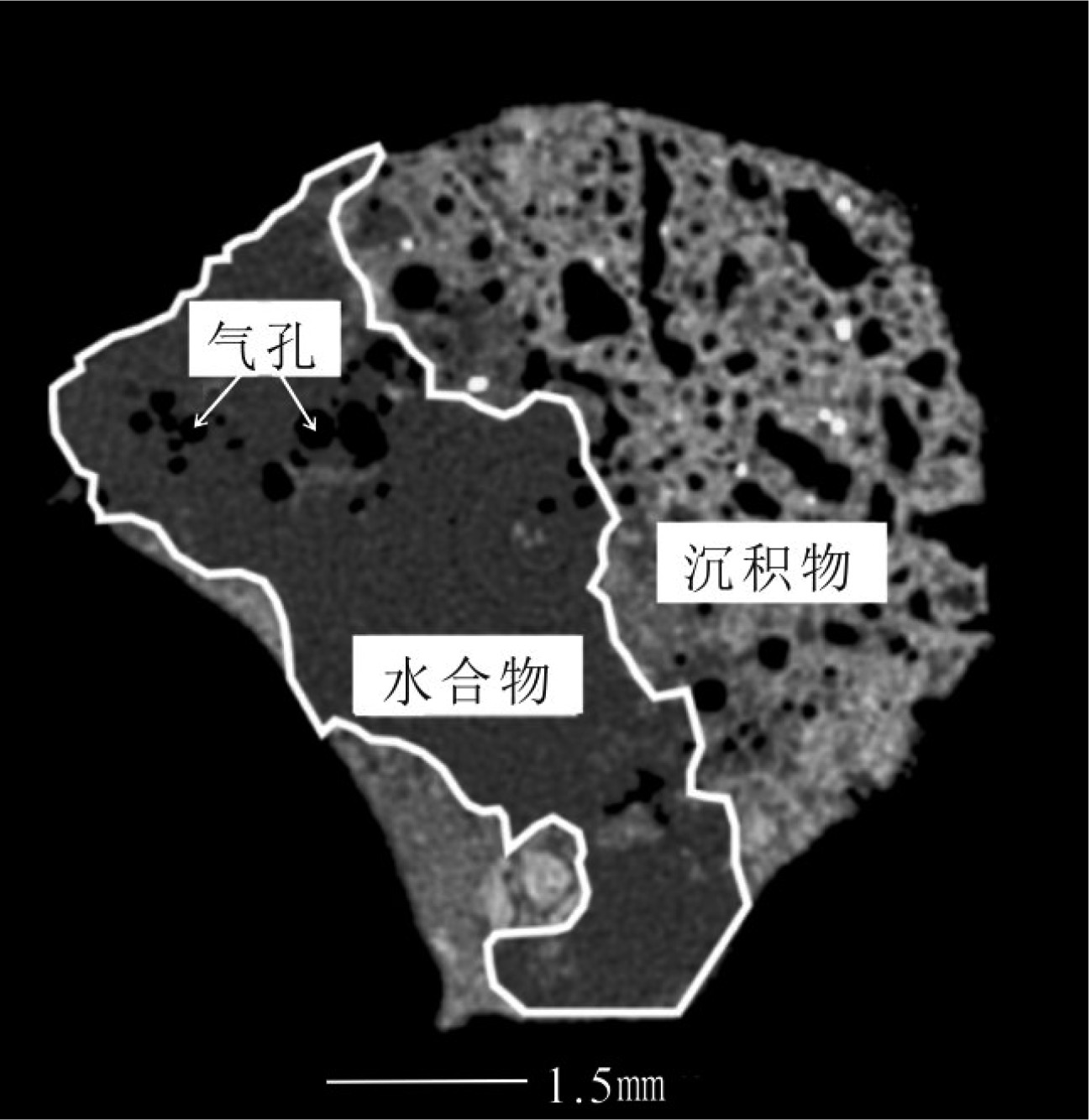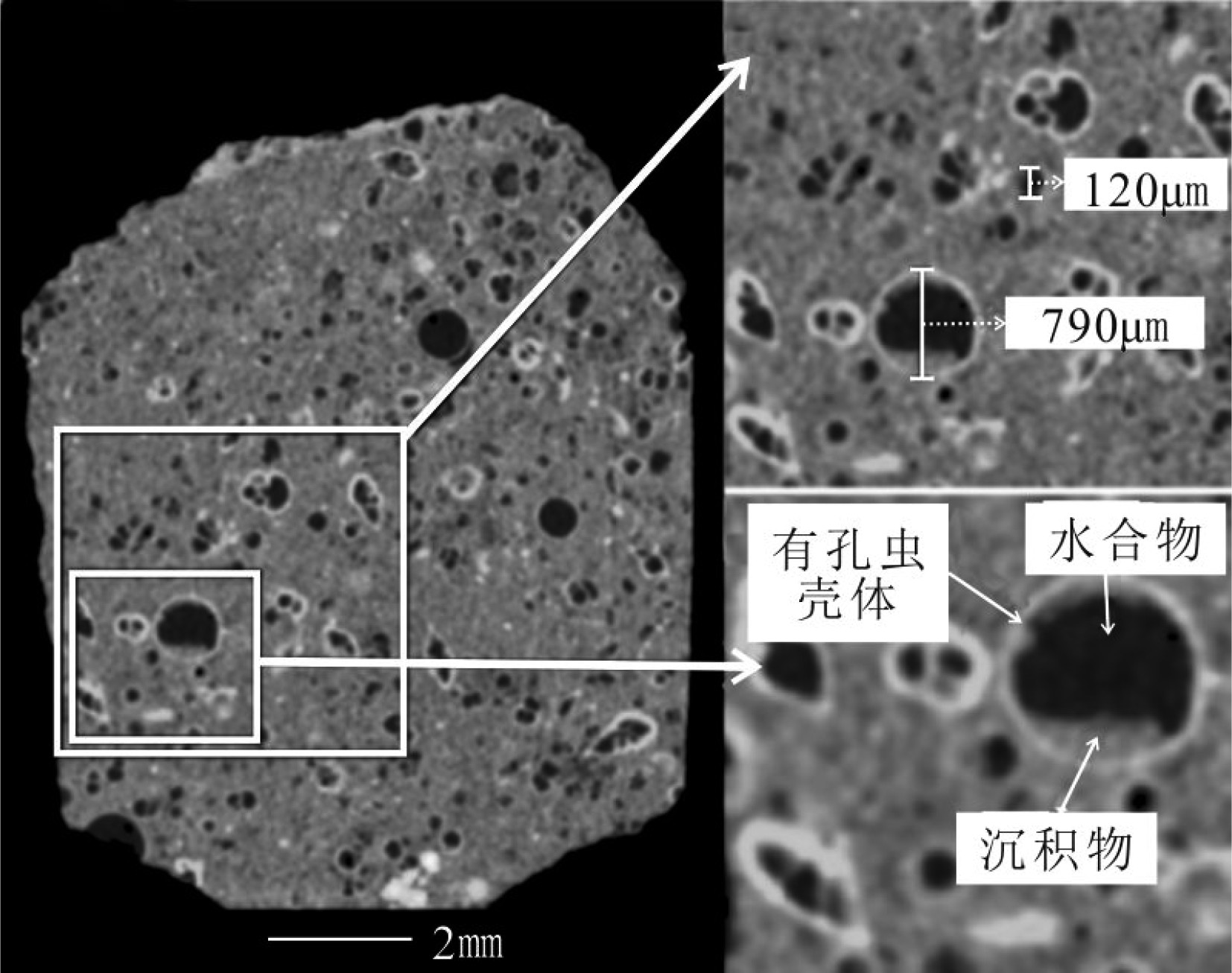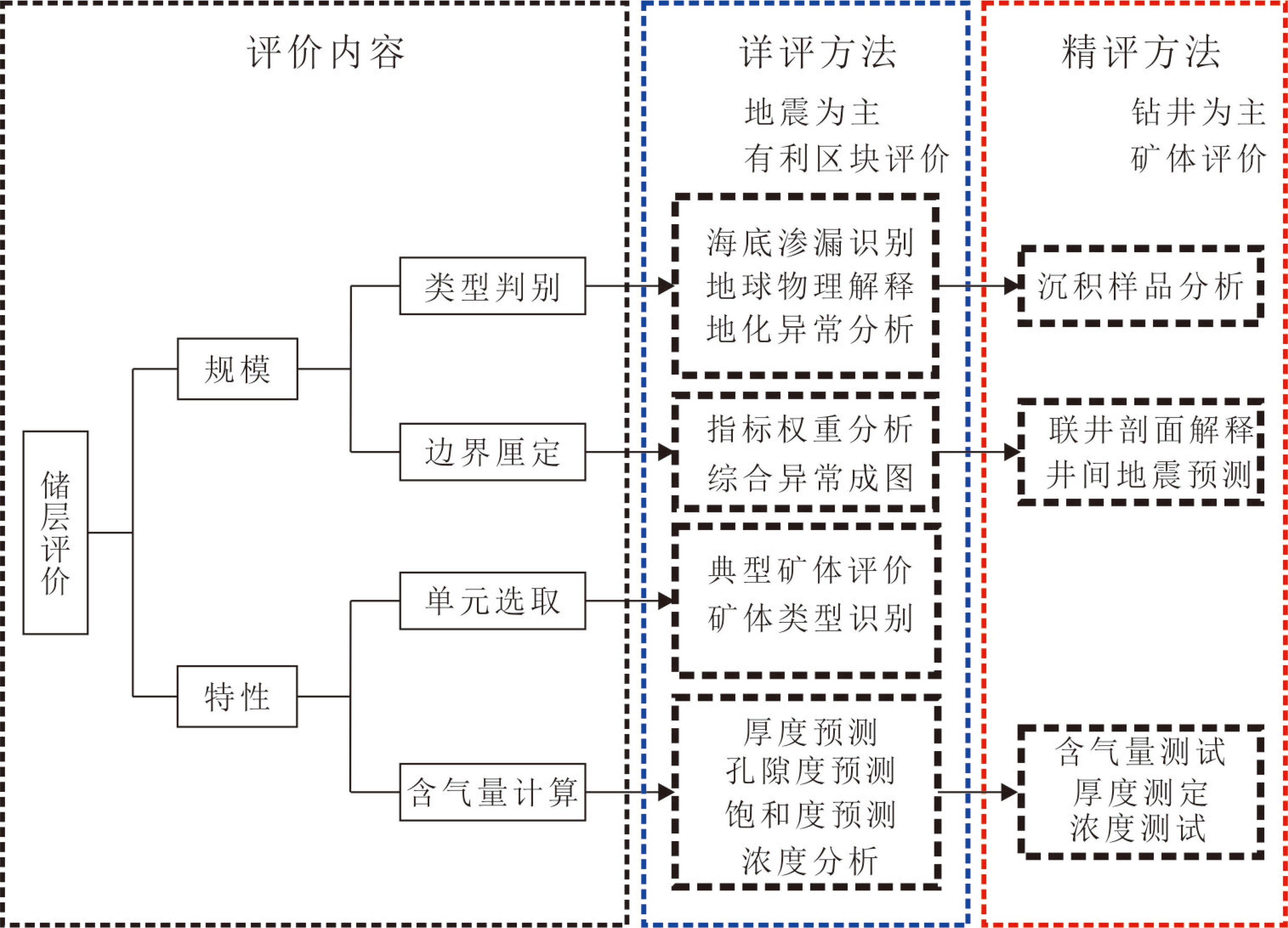Characteristics of marine gas hydrate reservoir and its resource evaluation methods
-
摘要:
天然气水合物资源开发的前提条件是准确评价其资源量,而正确理解天然气水合物储层特性是准确评价其资源量的基础。天然气水合物的含量及其赋存形态是影响储层特性的主要因素,赋存形态主要受海洋沉积物的储集的性质与大小控制。储层特征参数直接影响海洋天然气水合物资源评价的准确性。现有天然气水合物资源量评价方法的原理、评价参数及适用性各不相同,且均未考虑水合物的赋存类型。本文在前期工作的基础上,针对天然气水合物有利区块和矿体评价,分别提出了海洋天然气水合物“资源详评”与“资源精评”的新方法。基于小面元的资源详评方法,适用于钻井稀少、地球物理测网较为密集的有利区块孔隙填充型水合物控制地质储量评价;基于“水合物地层丰度”概念的资源精评方法,适用于井网密集的井场小范围矿体探明地质储量精准评价,可有效提高对块状、脉状和结核状等裂隙型填充型水合物资源评价的准确度。
Abstract:To accurately make resource evaluation is the prerequisite for development of natural gas hydrate resources, and the correct understanding of the characteristics of gas hydrate reservoir is the basis for such evaluation. The content and occurrence of gas hydrate are closely related to and affected by reservoir properties. The occurrence forms of gas hydrate, which includes pore-filling and fracture-filling, mainly depends on the nature and size of pores, fractures and other accumulation spaces in the marine sediments. Different types of hydrate reservoirs have different physical property response characteristics, which directly affects the accuracy of marine gas hydrate resource evaluation. The principles, evaluation parameters and applicability of the existing natural gas hydrate resource evaluation methods are different, and the occurrence type of hydrate is not considered. Based on the previous work, this paper puts forward a new method of "Detail Resource Evaluation" and "Precise Resource Evaluation" for marine natural gas hydrates. The "Detail Resource Evaluation" method based on small panel is suitable for the evaluation of pore-filled hydrate reservoir with rare drilling and dense geophysical survey network in favorable block; The "Precise Resource Evaluation" method based on the concept of "hydrate abundance in reservoir" is applicable to the accurate evaluation of small-scale hydrate orebody with dense well pattern in the well field, and can effectively improve the accuracy of the evaluation of fracture- filled types (e.g. massive, vein and nodule) hydrate resources.
-

-
图 1 海洋天然气水合物调查研究现状[5]
Figure 1.
-
[1] Boswell R, Hancock S, Yamamoto K, et al. 6-Natural gas hydrates: status of potential as an energy resource[M]// Letcher T M. Future Energy. 3rd ed. Boston: Elsevier, 2020: 111−131.
[2] 吴能友. 天然气水合物运聚体系: 理论、方法与实践[M]. 合肥: 安徽科学技术出版社, 2020: 1−294.
WU Nengyou. Gas Hydrate Migration and Accumulation System: Theory, Method and Practice[M]. Hefei: Anhui Science and Technology Press, 2020: 1−294.
[3] 宁伏龙, 梁金强, 吴能友, 等. 中国天然气水合物赋存特征[J]. 天然气工业, 2020, 40(8):1-24
NING Fulong, LIANG Jinqiang, WU Nengyou, et al. Reservoir characteristics of natural gas hydrates in China [J]. Natural Gas Industry, 2020, 40(8): 1-24.
[4] Chong Z R, Yang S H B, Babu P, et al. Review of natural gas hydrates as an energy resource: Prospects and challenges [J]. Applied Energy, 2016, 162: 1633-1652.
[5] Collett T, Bahk J J, Baker R, et al. Methane hydrates in nature-current knowledge and challenges [J]. Journal of Chemical & Engineering Data, 2015, 60(2): 319-329.
[6] Collett T S, Lee M W, Agena W F, et al. Permafrost-associated natural gas hydrate occurrences on the Alaska North Slope [J]. Marine and Petroleum Geology, 2011, 28(2): 279-294.
[7] Miyakawa A, Saito S, Yamada Y, et al. Gas hydrate saturation at Site C0002, IODP Expeditions 314 and 315, in the Kumano Basin, Nankai trough [J]. Island Arc, 2014, 23(2): 142-156.
[8] 吴时国, 王吉亮. 南海神狐海域天然气水合物试采成功后的思考[J]. 科学通报, 2018, 63(1):2-8
WU Shiguo, WANG Jiliang. On the China's successful gas production test from marine gas hydrate reservoirs [J]. Chinese Science Bulletin, 2018, 63(1): 2-8.
[9] Boswell R, Collett T S. Current perspectives on gas hydrate resources [J]. Energy & Environment Science, 2011, 4(4): 1206-1215.
[10] 叶建良, 秦绪文, 谢文卫, 等. 中国南海天然气水合物第二次试采主要进展[J]. 中国地质, 2020, 47(3):557-568
YE Jianliang, QIN Xuwen, XIE Wenwei, et al. Main progress of the second gas hydrate trial production in the South China Sea [J]. Geology In China, 2020, 47(3): 557-568.
[11] Haeckel M, Bialas J, Klaucke I, et al. Gas hydrate occurrences in the Black Sea- new observations from the German sugar Project [J]. Fire in the Ice:Methane Hydrate Newsletter, 2015, 15(2): 6-9.
[12] Collett T S, Lee M W, Zyrianova M V, et al. Gulf of Mexico gas hydrate Joint Industry Project Leg II logging‐while‐drilling data acquisition and analysis [J]. Marine and Petroleum Geology, 2012, 34(1): 41-61.
[13] Komatsu Y, Suzuki K, Fujii T. Sedimentary facies and paleoenvironments of a gas-hydrate- bearing sediment core in the eastern Nankai Trough, Japan [J]. Marine and Petroleum Geology, 2015, 66: 358-367.
[14] Malinverno A, Goldberg D S. Testing short‐range migration of microbial methane as a hydrate formation mechanism: Results from Andaman Sea and Kumano basin drill sites and global implications [J]. Earth and Planetary Science Letters, 2015, 422: 105-114.
[15] Ginsburg G, Soloviev V, Matveeva T, et al. 24. Sediment grain‐size control on gas hydrate presence, sites 994, 995 and 997[M]//Paull C K, Matsumoto R, Wallace P J, et al. Proceedings of the Ocean Drilling Program: Scientific Results 164. College Station, TX: Ocean Drilling Program, 2000: 1 − 459.
[16] Wang X J, Collett T S, Lee M W, et al. Geological controls on the occurrence of gas hydrate from core, downhole log, and seismic data in the Shenhu Area, South China Sea [J]. Marine Geology, 2014, 357: 272-292.
[17] Portnov A, Santra M, Cook A E, et al. The Jackalope gas hydrate system in the northeastern Gulf of Mexico [J]. Marine and Petroleum Geology, 2020, 111: 261-278.
[18] Matsumoto R, Tanahashi M, Kakuwa Y, et al. Recovery of thick deposits of massive gas hydrates from gas chimney structures, eastern margin of Japan Sea: Japan Sea shallow gas hydrate project [J]. Fire in the Ice:Methane Hydrate Newsletter, 2017, 17(1): 1-22.
[19] Liu C L, Meng Q G, Hu G W, et al. Characterization of hydrate-bearing sediments recovered from the Shenhu Area of the South China Sea [J]. Interpretation, 2017, 5(3): SM13-SM23.
[20] 陈芳, 苏新, 陆红锋, 等. 南海神狐海域有孔虫与高饱和度水合物的储存关系[J]. 地球科学:中国地质大学学报, 2013, 38(5):907-915
Chen Fang, Su Xin, Lu Hongfeng, et al. Relations between biogenic component (foraminifera) and highly saturated gas hydrates distribution from Shenhu Area, northern South China Sea [J]. Earth Science:Journal of China University of Geosciences, 2013, 38(5): 907-915.
[21] Li C F, Hu G W, Zhang W, et al. Influence of foraminifera on formation and occurrence characteristics of natural gas hydrates in fine-grained sediments from ShenHu Area, South China Sea [J]. Science China Earth Sciences, 2016, 59(11): 2223-2230.
[22] Bahk J J, Kim D H, Chun J H, et al. Gas hydrate occurrences and their relation to host sediment properties: results from Second Ulleung basin gas hydrate Drilling Expedition, East Sea [J]. Marine and Petroleum Geology, 2013, 47: 21-29.
[23] Liu C L, Ye Y G, Meng Q G, et al. The characteristics of gas hydrates recovered from Shenhu Area in the South China Sea [J]. Marine Geology, 2012, 307-310: 22-27.
[24] Liu C L, Meng Q G, He X L, et al. Characterization of natural gas hydrate recovered from Pearl River Mouth basin in South China Sea [J]. Marine and Petroleum Geology, 2015, 61: 14-21.
[25] Max M D, Johnson A H. Exploration and Production of Oceanic Natural Gas Hydrate: Critical Factors for Commercialization[M]. Switzerland: Springer, 2016.
[26] Wei J G, Liang J Q, Lu J G, et al. Characteristics and dynamics of gas hydrate systems in the northwestern South China Sea - Results of the fifth gas hydrate drilling expedition [J]. Marine and Petroleum Geology, 2019, 110: 287-298.
[27] 张辉, 卢海龙, 梁金强, 等. 南海北部神狐海域沉积物颗粒对天然气水合物聚集的主要影响[J]. 科学通报, 2016, 61(3):388-397
ZHANG Hui, LU Hailong, LIANG Jinqiang, et al. The methane hydrate accumulation controlled compellingly by sediment grain at Shenhu, northern South China Sea [J]. Chinese Science Bulletin, 2016, 61(3): 388-397.
[28] 姜衡, 苏明, 邬黛黛, 等. 南海北部陆坡神狐海域GMGS01 区块细粒浊积体的识别特征及意义[J]. 海洋地质与第四纪地质, 2017, 37(5): 131 − 140.
JIANG Heng, SU Ming, WU Daidai, et al. Fine- grained turbidites in GMGS01 of the Shenhu Area, northern South China Sea and its significance[J]. Marine Geology & Quaternary Geology, 2017, 37(5): 131 − 140.
[29] Horozal S, Kim G Y, Bahk J J, et al. Core and sediment physical property correlation of the second Ulleung Basin Gas Hydrate Drilling Expedition (UBGH2) results in the East Sea (Japan Sea) [J]. Marine and Petroleum Geology, 2015, 59: 535-562.
[30] Miyajima Y, Watanabe Y, Yanagisawa Y, et al. A late Miocene methane-seep deposit bearing methane-trapping silica minerals at Joetsu, central Japan [J]. Palaeogeography, Palaeoclimatology, Palaeoecology, 2016, 455: 1-15.
[31] Winters W J, Wilcox-Cline R W, Long P, et al. Comparison of the physical and geotechnical properties of gas-hydrate-bearing sediments from offshore India and other gas-hydrate-reservoir systems [J]. Marine and Petroleum Geology, 2014, 58: 139-167.
[32] Liu X L, Flemings P B. Capillary effects on hydrate stability in marine sediments [J]. Journal of Geophysical Research:Solid Earth, 2011, 116(B7): B07102.
[33] Lorenson T. Microscopic character of marine sediment containing disseminated gas hydrate: Examples from the Blake Ridge and the Middle America Trench[M]//Holder G D, Bishnoi P R. Gas Hydrates: Challenges for the Future. New York: Annals of the New York Academy of Sciences 2000: 1 − 1039.
[34] Collett T S, Boswell R, Cochran J R, et al. Geologic implications of gas hydrates in the offshore of India: Results of the National Gas Hydrate Program Expedition 01 [J]. Marine and Petroleum Geology, 2014, 58: 3-28.
[35] Hutchinson D R, Hart P E, Collett T S, et al. Geologic framework of the 2005 Keathley Canyon gas hydrate research well, northern Gulf of Mexico [J]. Marine and Petroleum Geology, 2008, 25(9): 906-918.
[36] Matsumoto R, Paull C, Wallace P. Gas hydrate sampling on the Blake Ridge and the Carolina Rise[R]. Ocean Drilling Program Leg 164 Preliminary Report, College Station, TX: Ocean Drilling Program, 1996(64): 1-72.
[37] Tréhu A M, Torres M E, Bohrmann G, et al. Leg 204 synthesis: gas hydrate distribution and dynamics in the central Cascadia accretionary complex[M]//Tréhu A M, Bohrmann G, Torres M E, et al. Proceedings of the Ocean Drilling Program: Scientific Results 204. College Station, TX: Ocean Drilling Program, 2006: 1-815.
[38] 钟广法, 张迪, 赵峦啸. 大洋钻探天然气水合物储层测井评价研究进展[J]. 天然气工业, 2020, 40(8):25-44
ZHONG Guangfa, ZHANG Di, ZHAO Luanxiao. Current states of well-logging evaluation of deep-sea gas hydrate-bearing sediments by international scientific ocean drilling (DSDP/ODP/IODP) programs [J]. Natural Gas Industry, 2020, 40(8): 25-44.
[39] 胡高伟, 业渝光, 张剑, 等. 松散沉积物中天然气水合物生成、分解过程与声学特性的实验研究[J]. 现代地质, 2008, 22(3):465-474
HU Gaowei, YE Yuguang, ZHANG Jian, et al. Study on gas hydrate formation-dissociation and its acoustic responses in unconsolidated sands [J]. Geoscience, 2008, 22(3): 465-474.
[40] 胡高伟, 业渝光, 张剑, 等. 基于弯曲元技术的含水合物松散沉积物声学特性研究[J]. 地球物理学报, 2012, 55(11):3762-3773
HU Gaowei, YE Yuguang, ZHANG Jian, et al. Acoustic properties of hydrate-bearing unconsolidated sediments based on bender element technique [J]. Chinese Journal of Geophysics, 2012, 55(11): 3762-3773.
[41] Best A I, Priest J A, Clayton C R I, et al. The effect of methane hydrate morphology and water saturation on seismic wave attenuation in sand under shallow sub-seafloor conditions [J]. Earth and Planetary Science Letters, 2013, 368: 78-87.
[42] 宁伏龙, 吴能友, 李实, 等. 基于常规测井方法估算原位水合物储集层力学参数[J]. 石油勘探与开发, 2013, 40(4):507-512
NING Fulong, WU Nengyou, LI Shi, et al. Estimation of in-situ mechanical properties of gas hydrate-bearing sediments by well logging [J]. Petroleum Exploration and Development, 2013, 40(4): 507-512.
[43] 陆敬安, 杨胜雄, 吴能友, 等. 南海神狐海域天然气水合物地球物理测井评价[J]. 现代地质, 2008, 22(3):447-451
LU Jing’an, YANG Shengxiong, WU Nengyou, et al. Well logging evaluation of gas hydrates in Shenhu Area, South China Sea [J]. Geoscience, 2008, 22(3): 447-451.
[44] Zhang W, Liang J Q, Wei J G, et al. Geological and geophysical features of and controls on occurrence and accumulation of gas hydrates in the first offshore gas-hydrate production test region in the Shenhu area, Northern South China Sea [J]. Marine and Petroleum Geology, 2020, 114: 104191.
[45] Ren S R, Liu Y J, Liu Y X, et al. Acoustic velocity and electrical resistance of hydrate bearing sediments [J]. Journal of Petroleum Science and Engineering, 2010, 70(1-2): 52-56.
[46] Lei L, Liu Z C, Seol Y, et al. An investigation of hydrate formation in unsaturated sediments using X‐Ray computed tomography [J]. Journal of Geophysical Research:Solid Earth, 2019, 124(4): 3335-3349.
[47] Dong H M, Sun J M, Zhu J J, et al. Developing a new hydrate saturation calculation model for hydrate-bearing sediments [J]. Fuel, 2019, 248: 27-37.
[48] Dong H M, Sun J M, Arif M, et al. A novel hybrid method for gas hydrate filling modes identification via digital rock [J]. Marine and Petroleum Geology, 2020, 115: 104255.
[49] 陈国旗, 李承峰, 刘昌岭, 等. 多孔介质中甲烷水合物的微观分布对电阻率的影响[J]. 新能源进展, 2019, 7(6):493-499
Chen Guoqi, Li Chengfeng, Liu Changling, et al. Effect of microscopic distribution of methane hydrate on resistivity in porous media [J]. Advances in New and Renewable Energy, 2019, 7(6): 493-499.
[50] Shankar U, Riedel M. Gas hydrate saturation in the Krishna-Godavari basin from P-wave velocity and electrical resistivity logs [J]. Marine and Petroleum Geology, 2011, 28(10): 1768-1778.
[51] Wang X J, Wu S G, Lee M, et al. Gas hydrate saturation from acoustic impedance and resistivity logs in the Shenhu Area, South China Sea [J]. Marine and Petroleum Geology, 2011, 28(9): 1625-1633.
[52] 胡高伟, 李彦龙, 吴能友, 等. 神狐海域W18/19 站位天然气水合物上覆层不排水抗剪强度预测[J]. 海洋地质与第四纪地质, 2017, 37(5):151-158
HU Gaowei, LI Yanlong, WU Nengyou, et al. Undrained shear strength estimation of the cover layer of hydrate at site W18/19 of Shenhu Area [J]. Marine Geology & Quaternary Geology, 2017, 37(5): 151-158.
[53] Luo T T, Song Y C, Zhu Y M, et al. Triaxial experiments on the mechanical properties of hydrate-bearing marine sediments of South China Sea [J]. Marine and Petroleum Geology, 2016, 77: 507-514.
[54] 石要红, 张旭辉, 鲁晓兵, 等. 南海水合物黏土沉积物力学特性试验模拟研究[J]. 力学学报, 2015, 47(3):521-528
SHI Yaohong, ZHANG Xuhui, LU Xiaobing, et al. Experimental study on the static mechanical properties of hydrate-bearing silty-clay in the South China Sea [J]. Chinese Journal of Theoretical and Applied Mechanics, 2015, 47(3): 521-528.
[55] 关进安, 卢静生, 梁德青, 等. 高压下南海神狐水合物区域海底沉积地层三轴力学性质初步测试[J]. 新能源进展, 2017, 5(1):40-46
GUAN Jin’an, LU Jingsheng, LIANG Deqing, et al. Preliminary tri-axial mechanical test on the hydrate-bearing media from Shenhu Area of South China Sea under high confining pressures [J]. Advances in New and Renewable Energy, 2017, 5(1): 40-46.
[56] Wang B, Huo P, Luo T T, et al. Analysis of the physical properties of hydrate sediments recovered from the Pearl River Mouth Basin in the South China Sea: Preliminary investigation for gas hydrate exploitation [J]. Energies, 2017, 10(4): 531.
[57] Wang L, Li Y H, Wu P, et al. Physical and mechanical properties of the overburden layer on gas hydrate-bearing sediments of the South China Sea [J]. Journal of Petroleum Science and Engineering, 2020, 189: 107020.
[58] 宁伏龙, 刘力, 李实, 等. 天然气水合物储层测井评价及其影响因素[J]. 石油学报, 2013, 34(3):591-606
NING Fulong, LIU Li, LI Shi, et al. Well logging assessment of natural gas hydrate reservoirs and relevant influential factors [J]. Acta Petrolei Sinica, 2013, 34(3): 591-606.
[59] Liu Z C, Wei H Z, Peng L, et al. An easy and efficient way to evaluate mechanical properties of gas hydrate-bearing sediments: The direct shear test [J]. Journal of Petroleum Science and Engineering, 2017, 149: 56-64.
[60] Liu Z C, Dai S, Ning F L, et al. Strength estimation for hydrate-bearing sediments from direct shear tests of hydrate-bearing sand and silt [J]. Geophysical Research Letters, 2018, 45(2): 715-723.
[61] 张永超, 刘昌岭, 刘乐乐, 等. 水合物生成导致沉积物孔隙结构和渗透率变化的低场核磁共振观测[J]. 海洋地质与第四纪地质, 2021, 41(3):193-202
ZHANG Yongchao, LIU Changling, LIU Lele, et al. Sediment pore-structure and permeability variation induced by hydrate formation: Evidence from low field nuclear magnetic resonance observation [J]. Marine Geology & Quaternary Geology, 2021, 41(3): 193-202.
[62] Li C F, Liu C L, Hu G W, et al. Investigation on the multi-parameter of hydrate-bearing sands using nano focus X-ray computed tomography [J]. Journal of Geophysical Research:Solid Earth, 2019, 124(3): 2286-2296.
[63] Zhang L X, Ge K, Wang J Q, et al. Pore-scale investigation of permeability evolution during hydrate formation using a pore network model based on X-ray CT [J]. Marine and Petroleum Geology, 2020, 113: 104157.
[64] Li J F, Ye J L, Qin X W, et al, The first offshore natural gas hydrate production test in South China Sea[J]. China Geology, 2018, 1(1): 5-16.
[65] 吴能友, 黄丽, 胡高伟, 等. 海域天然气水合物开采的地质控制因素和科学挑战[J]. 海洋地质与第四纪地质, 2017, 37(5):1-11
WU Nengyou, HUANG Li, HU Gaowei, et al. Geological controlling factors and scientific challenges for offshore gas hydrate exploitation [J]. Marine Geology & Quaternary Geology, 2017, 37(5): 1-11.
[66] Sun J X, Zhang L, Ning F L, et al. Production potential and stability of hydrate-bearing sediments at the site GMGS3-W19 in the South China Sea: A preliminary feasibility study [J]. Marine and Petroleum Geology, 2017, 86: 447-473.
[67] Zhang W, Liang J Q, Wei J G, et al. Origin of natural gases and associated gas hydrates in the Shenhu Area, northern South China Sea: Results from the China gas hydrate drilling expeditions [J]. Journal of Asian Earth Sciences, 2019, 183: 103953.
[68] Qin X W, Lu J A, Lu H L, et al. Coexistence of natural gas hydrate, free gas and water in the gas hydrate system in the Shenhu Area, South China Sea [J]. China Geology, 2020, 3(2): 210-220.
[69] Wang X J, Liu B, Qian J, et al. Geophysical evidence for gas hydrate accumulation related to methane seepage in the Taixinan Basin, South China Sea [J]. Journal of Asian Earth Sciences, 2018, 168: 27-37.
[70] Yang S X, Liang J Q, Lei Y, et al. GMGS4 gas hydrate drilling expedition in the South China Sea [J]. Fire in the Ice:Methane Hydrate Newsletter, 2017, 17(1): 7-11.
[71] Majumdar U, Cook A E. The volume of gas hydrate‐bound gas in the northern gulf of Mexico [J]. Geochemistry, Geophysics, Geosystems, 2018, 19(11): 4313-4328.
[72] Shankar U, Ojha M, Ghosh R. Assessment of gas hydrate reservoir from inverted seismic impedance and porosity in the northern Hikurangi margin, New Zealand [J]. Marine and Petroleum Geology, 2021, 123: 104751.
[73] Piñero E, Hensen C, Haeckel M, et al. 3-D numerical modelling of methane hydrate accumulations using PetroMod [J]. Marine and Petroleum Geology, 2016, 71: 288-295.
[74] Su P B, Liang J Q, Peng J, et al. Petroleum systems modeling on gas hydrate of the first experimental exploitation region in the Shenhu Area, northern South China Sea [J]. Journal of Asian Earth Sciences, 2018, 168: 57-76.
[75] Kroeger K F, Plaza-Faverola A, Barnes P M, et al. Thermal evolution of the New Zealand Hikurangi subduction margin: Impact on natural gas generation and methane hydrate formation-a model study [J]. Marine and Petroleum Geology, 2015, 63: 97-114.
[76] Hillman J I T, Crutchley G J, Kroeger K. Investigating the role of faults in fluid migration and gas hydrate formation along the southern Hikurangi Margin, New Zealand [J]. Marine Geophysical Research, 2020, 41(1): 8.
[77] Burwicz E, Haeckel M. Basin-scale estimates on petroleum components generation in the Western Black Sea basin based on 3-D numerical modelling [J]. Marine and Petroleum Geology, 2020, 113: 104122.
[78] Tsuji Y, Ishida H, Nakamizu M, et al. Overview of the MITI Nankai trough Wells: a milestone in the evaluation of methane hydrate resources [J]. Resource Geology, 2004, 54(1): 3-10.
[79] Trofimuk A A, Cherskiy N V, Tsarev V P. Accumulation of natural gases in zones of hydrate formation in the hydrosphere [J]. Doklady Akademii Nauk SSSR, 1973, 212: 931-934(inRussian).
[80] Cherskiy N V, Tsarev V P. Evaluation of the reserves in the light of search and prospecting of natural gases from the bottom sediments of the world’s ocean [J]. Geologiya i Geofizika, 1977, 5: 21-31.
[81] Trofimuk A A, Cherskiy N V, Tsarev V P. Gas hydrates-new sources of hydrocarbons [J]. Priroda (Nature), 1979, 1: 18-27.
[82] Kvenvolden K A, Claypool GE. Gas hydrates in oceanic sediment[R]. Open-File Report 88-216, Denver: US Geological Survey, 1988: 1-50.
[83] Gornitz V, Fung I. Potential distribution of methane hydrates in the world’s oceans [J]. Global Biogeochemical Cycles, 1994, 8(3): 335-347.
[84] Kvenvolden K A. Potential effects of gas hydrate on human welfare [J]. Proceedings of National Academy of Science of the United States of America, 1999, 96(7): 3420-3426.
[85] Archer D, Buffet B, Brovkin V. Ocean methane hydrates as a slow tipping point in the global carbon cycle [J]. Proceedings of the National Academy of Sciences of the United States of America, 2009, 106(49): 20596-20601.
[86] Johnson A H. Global resource potential of gas hydrate- a new calculation [J]. Fire in the Ice:Methane Hydrate Newsletter, 2011, 11(2): 1-4.
[87] Piñero E, Marquardt M, Hensen C, et al. Estimation of the global inventory of methane hydrates in marine sediments using transfer functions [J]. Biogeosciences, 2013, 10(2): 959-975.
[88] Kretschmer K, Biastoch A, Rüpke L, et al. Modeling the fate of methane hydrates under global warming [J]. Global Biogeochemical. Cycles, 2015, 29(5): 610-625.
[89] Collett T S, Johnson A H, Knapp C C, et al. Natural gas hydrates: A review[M]//Collett TS, Johnson A, Knapp C, et al. Natural gas hydrates-Energy resource potential and associated geologic hazards. Tulsa, Oklahoma, USA: American Association of Petroleum Geologists, 2009, 89: 146-219.
-




 下载:
下载:




